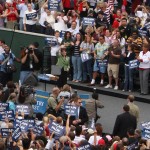Low church baby-boomers like myself grew up only knowing about the birth and death parts of the liturgical calendar. Now it seems all Protestants do, from high to low. On a recent drive around Chicagoland I heard a broadcast from WMBI (the radio station of Moody Bible Institute) in which the pastor — I believe from Moody Memorial Church — mentioned Advent. My wife and I looked at each other and both nodded to my remark that we would never have heard the word “Advent” in your conservative Protestant youth.
But now Advent is everywhere. And it is even a time when some evangelicals such as Wheaton College professor, Larycia Hawkins, decided to don a hijab in order to show solidarity with Muslims. Whether it shows solidarity with high church Christians to adorn oneself during the weeks of preparation before Christmas is a matter that seems to have escaped all comment in a story that doesn’t seem to want to go away.
The conservative Protestantism (okay, fundamentalism) in which I also grew up would also have regarded observing Advent as something that “liberal” or “modernist” Protestants did. We were oriented to look for any sort of departure from the straight and narrow. Church calendar folderol was the least of our worries. Doctrine was at the top of the list. And we knew that some who called themselves Christian might say Christian sounding things but that they also didn’t mean those words the way we did.
I was reminded of this when reading John Fea’s post about the ongoing controversy over Dr. Hawkin’s remarks. After hearing her explanation, Fea concluded:
After listening to Hawkins speak in a video posted by The Chicago Tribune it seems that her decision to wear the hijab and acknowledge the common monotheistic ancestry of Christians and Muslims was a direct expression of her evangelical faith. Think about it. How many political science professors in the United States engage in what Hawkins calls “Advent worship?” Better yet, how many evangelical Christians–the kind of folks who could sign Wheaton’s statement of faith–participate in “Advent worship?” On this front, Hawkins appeared to be a model faculty member.
John Fea, a friend, is not that much younger than I. I would imagine that he knew at some point in his youth evangelicals who did not participate in “Advent worship.” So why would that be a marker of evangelical authenticity? Anglicanism or Lutheranism? For sure. But evangelicalism?
What is more, I wonder why someone like John would not be a tad skeptical about a professor’s statement of faith. I can well imagine any number of mainline Protestant ministers and laity also being able to affirm Wheaton’s statement of faith and also participating in Advent worship. But I grew up learning to be suspicious of such affirmations unless they accompanied other markers of devoted Christian identity.
Maybe the difference between John Fea and me is the one that divides historians. There are two kinds of such chroniclers of the past — lumpers and splitters, those who see consensus and those who feature conflict. Maybe conservative Protestantism produces historians who split.












